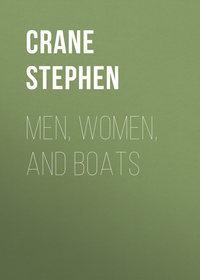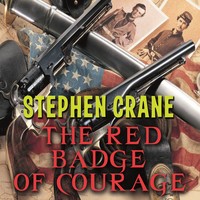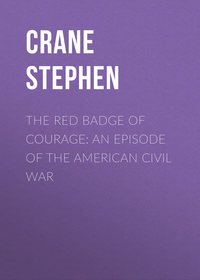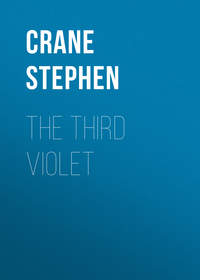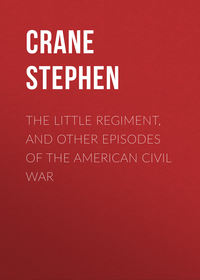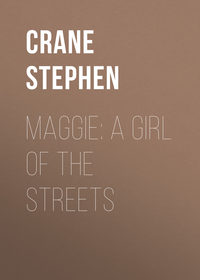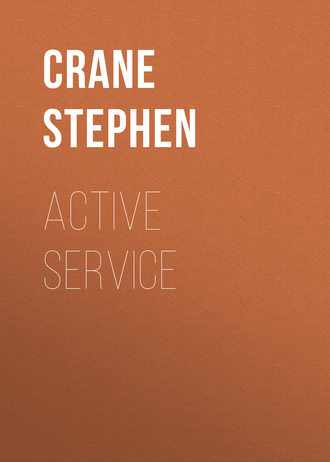 полная версия
полная версияActive Service
As they rode on, he deliberated as to the best means of dealing with this condition. Suddenly he resolved to go with the whole tale direct to Marjory, and to this end he half wheeled his horse. He would reiterate that he loved her and then explain- explain ! He groaned when he came to the word, and ceased formulation.
The cavalcade reached at last the bank of the Aracthus river, with its lemon groves and lush grass. A battery wheeled before them over the ancient bridge -a flight of short, broad cobbled steps up as far as the centre of the stream and a similar flight down to the other bank. The returning aplomb of the travellers was well illustrated by the professor, who, upon sighting this bridge, murmured : " Byzantine."
This was the first indication that he had still within him a power to resume the normal.
The steep and narrow street was crowded with soldiers; the smoky little coffee shops were a-babble with people discussing the news from the front. None seemed to heed the remarkable procession that wended its way to the cable office. Here Coleman resolutely took precedence. He knew that there was no good in expecting intelligence out of the chaotic clerks, but he managed to get upon the wires this message :
" Eclipse, New York: Got Wainwright party; all well. Coleman." The students had struggled to send messages to their people in America, but they had only succeeded in deepening the tragic boredom of the clerks.
When Coleman returned to the street he thought that he had seldom looked upon a more moving spectacle than the Wainwright party presented at that moment. Most of the students were seated in a row, dejectedly, upon the kerb. The professor and Mrs. Wainwright looked like two old pictures, which, after an existence in a considerate gloom, had been brought out in their tawdriness to the clear light. Hot white dust covered everybody, and from out the grimy faces the eyes blinked, red-fringed with sleeplessness. Desolation sat upon all, save Marjory. She possessed some marvellous power of looking always fresh. This quality had indeed impressed the old lady on the little pony until she had said to Nora Black: "That girl would look well anywhere." Nora Black had not been amiable in her reply.
Coleman called the professor and the dragoman for a durbar. The dragoman said: "Well, I can get one carriage, and we can go immediate-lee."
" Carriage be blowed! " said Coleman. " What these people need is rest, sleep. You must find a place at once. These people can't remain in the street." He spoke in anger, as if he had previously told the dragoman and the latter had been inattentive. The man immediately departed.
Coleman remarked that there was no course but to remain in the street until his dragoman had found them a habitation. It was a mournful waiting. The students sat on the kerb. Once they whispered to Coleman, suggesting a drink, but he told them that he knew only one cafe, the entrance of which would be in plain sight of the rest of the party. The ladies talked together in a group of four. Nora Black was bursting with the fact that her servant had hired rooms in Arta on their outcoming journey, and she wished Mrs. Wainwright and Marjory to come to them, at least for a time, but she dared not risk a refusal, and she felt something in Mrs. Wainwright's manner which led her to be certain that such would be the answer to her invitation. Coleman and the professor strolled slowly up and down the walk.
" Well, my work is over, sir," said Coleman. " My paper told me to find you, and, through no virtue of my own, I found you. I am very glad of it. I don't know of anything in my life that has given me greater pleasure."
The professor was himself again in so far as he had lost all manner of dependence. But still he could not yet be bumptious. " Mr. Coleman," he said, "I am placed under life-long obligation to you. * * * I am not thinking of myself so much. * * * My wife and daughter–" His gratitude was so genuine that he could not finish its expression.
" Oh, don't speak of it," said Coleman. " I really didn't do anything at all."
The dragoman finally returned and led them all to a house which he had rented for gold. In the great, bare, upper chamber the students dropped wearily to the floor, while the woman of the house took the Wainwrights to a more secluded apartment., As the door closed on them, Coleman turned like a flash.
" Have a drink," he said. The students arose around him like the wave of a flood. "You bet." In the absence of changes of clothing, ordinary food, the possibility of a bath, and in the presence of great weariness and dust, Coleman's whisky seemed to them a glistening luxury. Afterward they laid down as if to sleep, but in reality they were too dirty and too fagged to sleep. They simply lay murmuring Peter Tounley even developed a small fever.
It was at this time that Coleman. suddenly discovered his acute interest in the progressive troubles of his affair of the heart had placed the business of his newspaper in the rear of his mind. The greater part of the next hour he spent in getting off to New York that dispatch which created so much excitement for him later. Afterward he was free to reflect moodily upon the ability of Nora Black to distress him. She, with her retinue, had disappeared toward her own rooms. At dusk he went into the street, and was edified to see Nora's dragoman dodging along in his wake. He thought that this was simply another manifestation of Nora's interest in his movements, and so he turned a corner, and there pausing, waited until the dragoman spun around directly into his arms. But it seemed that the man had a note to deliver, and this was only his Oriental way of doing it.
The note read: " Come and dine with me to-night." It was, not a request. It was peremptory. "All right," he said, scowling at the man.
He did not go at once, for he wished to reflect for a time and find if he could not evolve some weapons of his own. It seemed to him that all the others were liberally supplied with weapons.
A clear, cold night had come upon the earth when he signified to the lurking dragoman that he was in readiness to depart with him to Nora's abode. They passed finally into a dark court-yard, up a winding staircase, across an embowered balcony, and Coleman entered alone a room where there were lights.
His, feet were scarcely over the threshold before he had concluded that the tigress was now going to try some velvet purring. He noted that the arts of the stage had not been thought too cheaply obvious for use. Nora sat facing the door. A bit of yellow silk had been twisted about the crude shape of the lamp, and it made the play of light, amber-like, shadowy and yet perfectly clear, the light which women love. She was arrayed in a puzzling gown of that kind of Gre- cian silk which is so docile that one can pull yards of it through a ring. It was of the colour of new straw. Her chin was leaned pensively upon her palm and the light fell on a pearly rounded forearm. She was looking at him with a pair of famous eyes, azure, per- haps-certainly purple at times-and it may be, black at odd moments-a pair of eyes that had made many an honest man's heart jump if he thought they were looking at him. It was a vision, yes, but Coleman's cynical knowledge of drama overpowered his sense of its beauty. He broke out brutally, in the phrases of the American street. "Your dragoman is a rubber-neck. If he keeps darking me I will simply have to kick the stuffing out of him."
She was alone in the room. Her old lady had been instructed to have a headache and send apologies. She was not disturbed by Coleman's words. "Sit down, Rufus, and have a cigarette, and don't be cross, because I won't stand it."
He obeyed her glumly. She had placed his chair where not a charm of her could be lost upon an observant man. Evidently she did not purpose to allow him to irritate her away from her original plan. Purring was now her method, and none of his insolence could achieve a growl from the tigress. She arose, saying softly: "You look tired, almost ill, poor boy. I will give you some brandy. I have almost everything that I could think to make those Daylight people buy." With a sweep of her hand she indicated the astonishing opulence of the possessions in different parts of the room.
As she stood over him with the brandy there came through the smoke of his cigarette the perfume of orris-root and violet.
A servant began to arrange the little cold dinner on a camp table, and Coleman saw with an enthusiasm which he could not fully master, four quart bottles of a notable brand of champagne placed in a rank on the floor.
At dinner Nora was sisterly. She watched him, waited upon him, treated him to an affectionate inti. macy for which he knew a thousand men who would have hated him. The champagne was cold.
Slowly he melted. By the time that the boy came with little cups of Turkish coffee he was at least amiable. Nora talked dreamily. " The dragoman says this room used to be part of the harem long ago." She shot him a watchful glance, as if she had expected the fact to affect him. "Seems curious, doesn't it? A harem. Fancy that." He smoked one cigar and then discarded tobacco, for the perfume of orris-root and violet was making him meditate. Nora talked on in a low voice. She knew that, through half-closed lids, he was looking at her in steady speculation. She knew that she was conquering, but no movement of hers betrayed an elation. With the most exquisite art she aided his contemplation, baring to him, for instance, the glories of a statuesque neck, doing it all with the manner of a splendid and fabulous virgin who knew not that there was such a thing as shame. Her stockings were of black silk.
Coleman presently answered her only in monosyllable, making small distinction between yes and no. He simply sat watching her with eyes in which there were two little covetous steel-coloured flames.
He was thinking, "To go to the devil-to go to the devil-to go to the devil with this girl is not a bad fate-not a bad fate-not a bad fate."
CHAPTER XVII
" Come out on the balcony," cooed Nora. "There are some funny old storks on top of some chimneys near here and they clatter like mad all day and night."
They moved together out to the balcony, but Nora retreated with a little cry when she felt the coldness of the night. She said that she would get a cloak. Coleman was not unlike a man in a dream. He walked to the rail of the balcony where a great vine climbed toward the roof. He noted that it was dotted with. blossoms, which in the deep purple of the Oriental night were coloured in strange shades of maroon. This truth penetrated his abstraction until when Nora came she found him staring at them as if their colour was a revelation which affected him vitally. She moved to his side without sound and he first knew of her presence from the damning fragrance. She spoke just above her breath. "It's a beautiful evening." " Yes," he answered. She was at his shoulder. If he moved two inches he must come in contact. They remained in silence leaning upon the rail. Finally he began to mutter some commonplaces which meant nothing particularly, but into his tone as he mouthed them was the note of a forlorn and passionate lover. Then as if by accident he traversed the two inches and his shoulder was against the soft and yet firm shoulder of Nora Black. There was something in his throat at this time which changed his voice into a mere choking noise. She did not move. He could see her eyes glowing innocently out of the pallour which the darkness gave to her face. If he was touching her, she did not seem to know it.
"I am awfully tired," said Coleman, thickly. "I think I will go home and turn in."
" You must be, poor boy," said Nora tenderly.
"Wouldn't you like a little more of that champagne?"
" Well, I don't mind another glass."
She left him again and his galloping thought pounded to the old refrain. " To go to the devil-to go to the devil-to go to the devil with this girl is not a bad fate-not a bad fate- not a bad fate." When she returned he drank his glass of champagne. Then he mumbled: " You must be cold. Let me put your cape around you better. It won't do to catch cold here, you know."
She made a sweet pretence of rendering herself to his care. " Oh, thanks * * * I am not really cold * * * There that's better."
Of course all his manipulation of the cloak had been a fervid caress, and although her acting up to this point had remained in the role of the splendid and fabulous virgin she now turned her liquid eyes to his with a look that expressed knowledge, triumph and delight. She was sure of her victory. And she said: "Sweetheart * * * don't you think I am as nice as Marjory ?" The impulse had been airily confident. It was as if the silken cords had been parted by the sweep of a sword. Coleman's face had instantly stiffened and he looked like a man suddenly recalled to the ways of light. It may easily have been that in a moment he would have lapsed again to his luxurious dreaming. But in his face the girl had read a fatal character to her blunder and her resentment against him took precedence of any other emotion. She wheeled abruptly from him and said with great contempt: " Rufus, you had better go home. You're tired and sleepy, and more or less drunk."
He knew that the grand tumble of all their little embowered incident could be neither stayed or mended. "Yes," he answered, sulkily, "I think so too." They shook hands huffily and he went away.
When he arrived among the students he found that they had appropriated everything of his which would conduce to their comfort. He was furious over it. But to his bitter speeches they replied in jibes.
"Rufus is himself again. Admire his angelic disposition. See him smile. Gentle soul."
A sleepy voice said from a comer: " I know what pinches him."
" What ? " asked several.
"He's been to see Nora and she flung him out bodily."
" Yes?" sneered Coleman. "At times I seem to see in you, Coke, the fermentation of some primeval form of sensation, as if it were possible for you to de- velop a mind in two or three thousand years, and then at other times you appear * * * much as you are now."
As soon as they had well measured Coleman's temper all of the students save Coke kept their mouths tightly closed. Coke either did not understand or his mood was too vindictive for silence. " Well, I know you got a throw-down all right," he muttered.
"And how would you know when I got a throw down? You pimply, milk-fed sophomore."
The others perked up their ears in mirthful appreciation of this language.
" Of course," continued Coleman, " no one would protest against your continued existence, Coke, unless you insist on recalling yourself violently to people's attention in this way. The mere fact of your living would not usually be offensive to people if you weren't eternally turning a sort of calcium light on your prehensile attributes." Coke was suddenly angry, angry much like a peasant, and his anger first evinced itself in a mere sputtering and spluttering. Finally he got out a rather long speech, full of grumbling noises, but he was understood by all to declare that his prehensile attributes had not led him to cart a notorious woman about the world with him. When they quickly looked at Coleman they saw that he was livid. " You-"
But, of course, there immediately arose all sorts of protesting cries from the seven non-combatants. Coleman, as he took two strides toward Coke's corner, looked fully able to break him across his knee, but for this Coke did not seem to care at all. He was on his feet with a challenge in his eye. Upon each cheek burned a sudden hectic spot. The others were clamouring, "Oh, say, this won't do. Quit it. Oh, we mustn't have a fight. He didn't mean it, Coleman." Peter Tounley pressed Coke to the wall saying: " You damned young jackass, be quiet."
They were in the midst of these. festivities when a door opened and disclosed the professor. He might. have been coming into the middle of a row in one of the corridors of the college at home only this time he carried a candle. His speech, however, was a Washurst speech : " Gentlemen, gentlemen, what does this mean ? " All seemed to expect Coleman to make the answer. He was suddenly very cool. "Nothing, professor," he said, " only that this-only that Coke has insulted me. I suppose that it was only the irresponsibility of a boy, and I beg that you will not trouble over it."
" Mr. Coke," said the professor, indignantly, " what have you to say to this? " Evidently he could not clearly see Coke, and he peered around his candle at where the virtuous Peter Tounley was expostulating with the young man. The figures of all the excited group moving in the candle light caused vast and uncouth shadows to have conflicts in the end of the room.
Peter Tounley's task was not light, and beyond that he had the conviction that his struggle with Coke was making him also to appear as a rowdy. This conviction was proven to be true by a sudden thunder from the old professor, " Mr. Tounley, desist ! "
In wrath he desisted and Coke flung himself forward. He paid less attention to the professor than if the latter had been a jack-rabbit. " You say I insulted you? he shouted crazily in Coleman's face.
"Well * * * I meant to, do you see ? "
Coleman was glacial and lofty beyond everything.
"I am glad to have you admit the truth of what I have said."
Coke was, still suffocating with his peasant rage, which would not allow him to meet the clear, calm expressions of Coleman. "Yes * * * I insulted you * * * I insulted you because what I said was correct * * my prehensile attributes * * yes but I have never–"
He was interrupted by a chorus from the other students.
"Oh, no, that won't do. Don't say that. Don't repeat that, Coke."
Coleman remembered the weak bewilderment of the little professor in hours that had not long passed, and it was with something of an impersonal satisfac- tion that he said to himself: " The old boy's got his war-paint on again." The professor had stepped sharply up to Coke and looked at him with eyes that seemed to throw out flame and heat. There was a moment's pause, and then the old scholar spoke, bit- ing his words as if they were each a short section of steel wire. " Mr. Coke, your behaviour will end your college career abruptly and in gloom, I promise you. You have been drinking."
Coke, his head simply floating in a sea of universal defiance, at once blurted out: " Yes, sir."
"You have been drinking?" cried the professor, ferociously. "Retire to your-retire to your–retire–" And then in a voice of thunder he shouted: "Retire."
Whereupon seven hoodlum students waited a decent moment, then shrieked with laughter. But the old professor would have none of their nonsense. He quelled them all with force and finish.
Coleman now spoke a few words." Professor, I can't tell you how sorry I am that I should be concerned in any such riot as this, and since we are doomed to be bound so closely into each other's society I offer myself without reservation as being willing to repair the damage as well as may be, done. I don t see how I can forget at once that Coke's conduct was insolently unwarranted, but * * * if he has anything to sayof a nature that might heal the breach I would be willing to to meet him in the openest manner." As he made these re- marks Coleman's dignity was something grand, and, Morever, there was now upon his face that curious look of temperance and purity which had been noted in New York as a singular physical characteristic. If he. was guilty of anything in this affair at all-in fact, if he had ever at any time been guilty of anything- no mark had come to stain that bloom of innocence. The professor nodded in the fullest appreciation and sympathy. " Of course * * * really there is no other sleeping placeI suppose it would be better-" Then he again attacked Coke. "Young man, you have chosen an unfortunate moment to fill us with a suspicion that you may not be a gentleman. For the time there is nothing to be done with you." He addressed the other students. " There is nothing for me to do, young gentleman, but to leave Mr. Coke in your care. Good-night, sirs. Good-night, Coleman." He left the room with his candle.
When Coke was bade to " Retire " he had, of course, simply retreated fuming to a corner of the room where he remained looking with yellow eyes like an animal from a cave. When the others were able to see through the haze of mental confusion they found that Coleman was with deliberation taking off his boots. " Afterward, when he removed his waist-coat, he took great care to wind his large gold watch.
The students, much subdued, lay again in their places, and when there was any talking it was of an extremely local nature, referring principally to the floor As being unsuitable for beds and also referring from time to time to a real or an alleged selfishness on the part of some one of the recumbent men. Soon there was only the sound of heavy breathing.
When the professor had returned to what he called the Wainwright part of the house he was greeted instantly with the question: "What was it?" His wife and daughter were up in alarm. "What was it " they repeated, wildly.
He was peevish. " Oh, nothing, nothing. But that young Coke is a regular ruffian. He had gotten him. self into some tremendous uproar with Coleman. When I arrived he seemed actually trying to assault him. Revolting! He had been drinking. Coleman's behaviour, I must say, was splendid. Recognised at once the delicacy of my position-he not being a student. If I had found him in the wrong it would have been simpler than finding him in the right. Confound that rascal of a Coke." Then, as he began a partial disrobing, he treated them to grunted scrap of information. " Coke was quite insane * * * I feared that I couldn't control him * * * Coleman was like ice * * * and as much as I have seen to admire in him during the last few days, this quiet beat it all. If he had not recognised my helplessness as far as he was concerned the whole thing might have been a most miserable business. He is a very fine young man." The dissenting voice to this last tribute was the voice of Mrs. Wainwright. She said: " Well, Coleman drinks, too-everybody knows that."
" I know," responded the professor, rather bashfully, but I am confident that he had not touched a drop." Marjory said nothing.
The earlier artillery battles had frightened most of the furniture out of the houses of Arta, and there was left in this room only a few old red cushions, and the Wainwrights were camping upon the floor. Marjory was enwrapped in Coleman's macintosh, and while the professor and his wife maintained some low talk of the recent incident she in silence had turned her cheek into the yellow velvet collar of the coat. She felt something against her bosom, and putting her hand carefully into the top pocket of the coat she found three cigars. These she took in the darkness and laid aside, telling herself to remember their position in the morning. She had no doubt that Coleman: would rejoice over them, before he could get back to, Athens where there were other good cigars.
CHAPTER XVIII
THE ladies of the Wainwright party had not complained at all when deprived of even such civilised advantages as a shelter and a knife and fork and soap and water, but Mrs. Wainwright complained bitterly amid the half-civilisation of Arta. She could see here no excuse for the absence of several hundred things which she had always regarded as essential to life. She began at 8.30 A. M. to make both the professor and Marjory woeful with an endless dissertation upon the beds in the hotel at Athens. Of course she had not regarded them at the time as being exceptional beds * * * that was quite true, * * * but then one really never knew what one was really missing until one really missed it * * * She would never have thought that she would come to consider those Athenian beds as excellent * * * but experience is a great teacher * * * makes- one reflect upon the people who year in and year out have no beds at all, poor things. * * * Well, it made one glad if one did have a good bed, even if it was at the time on the other side of the world. If she ever reached it she did not know what could ever induce her to leave it again. * * * She would never be induced–
"'Induced!'" snarled the professor. The word represented to him a practiced feminine misusage of truth, and at such his white warlock always arose. "" Induced!' Out of four American women I have seen lately, you seem to be the only one who would say that you had endured this thing because you had been 'induced' by others to come over here. How absurd!"


